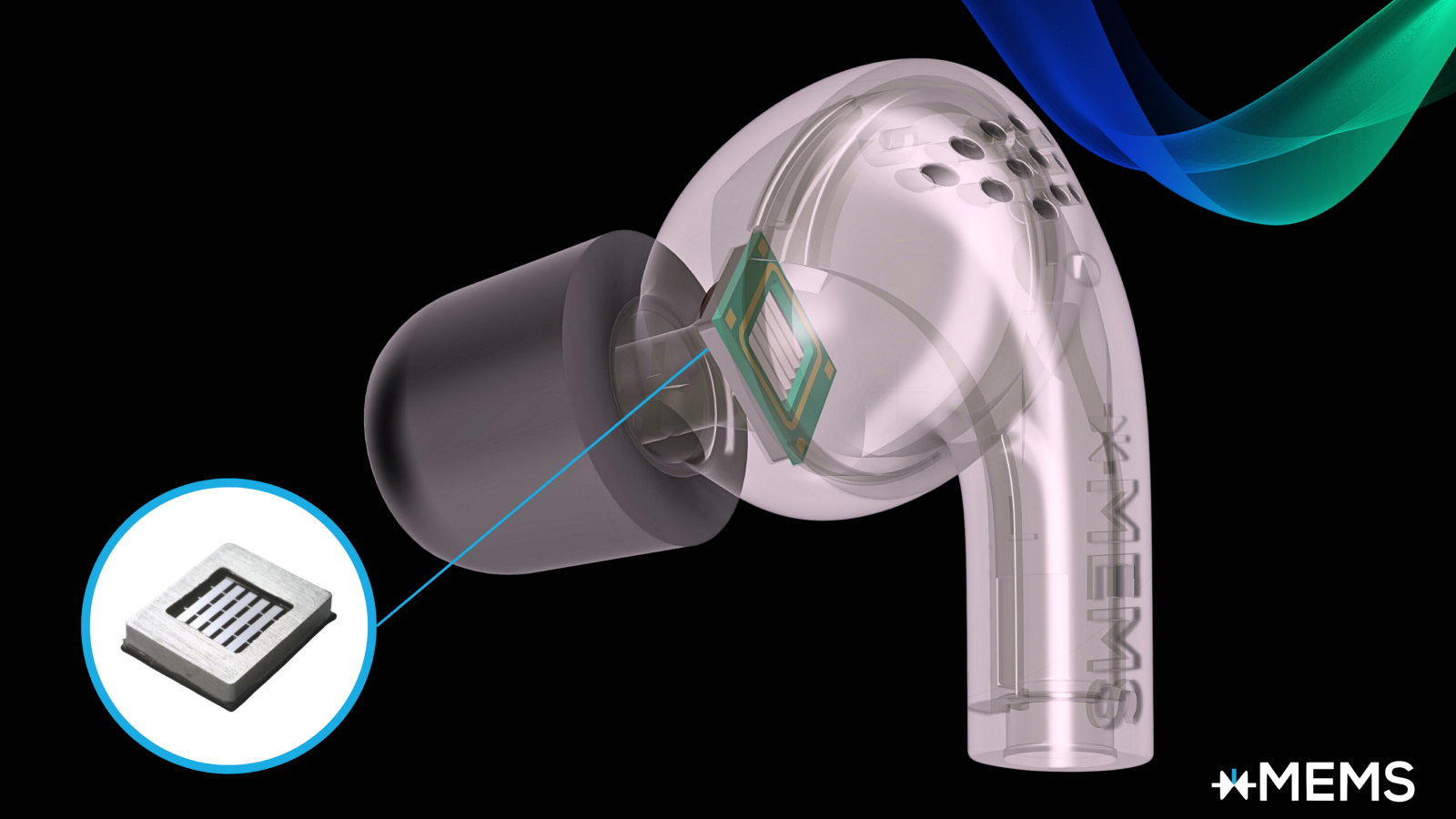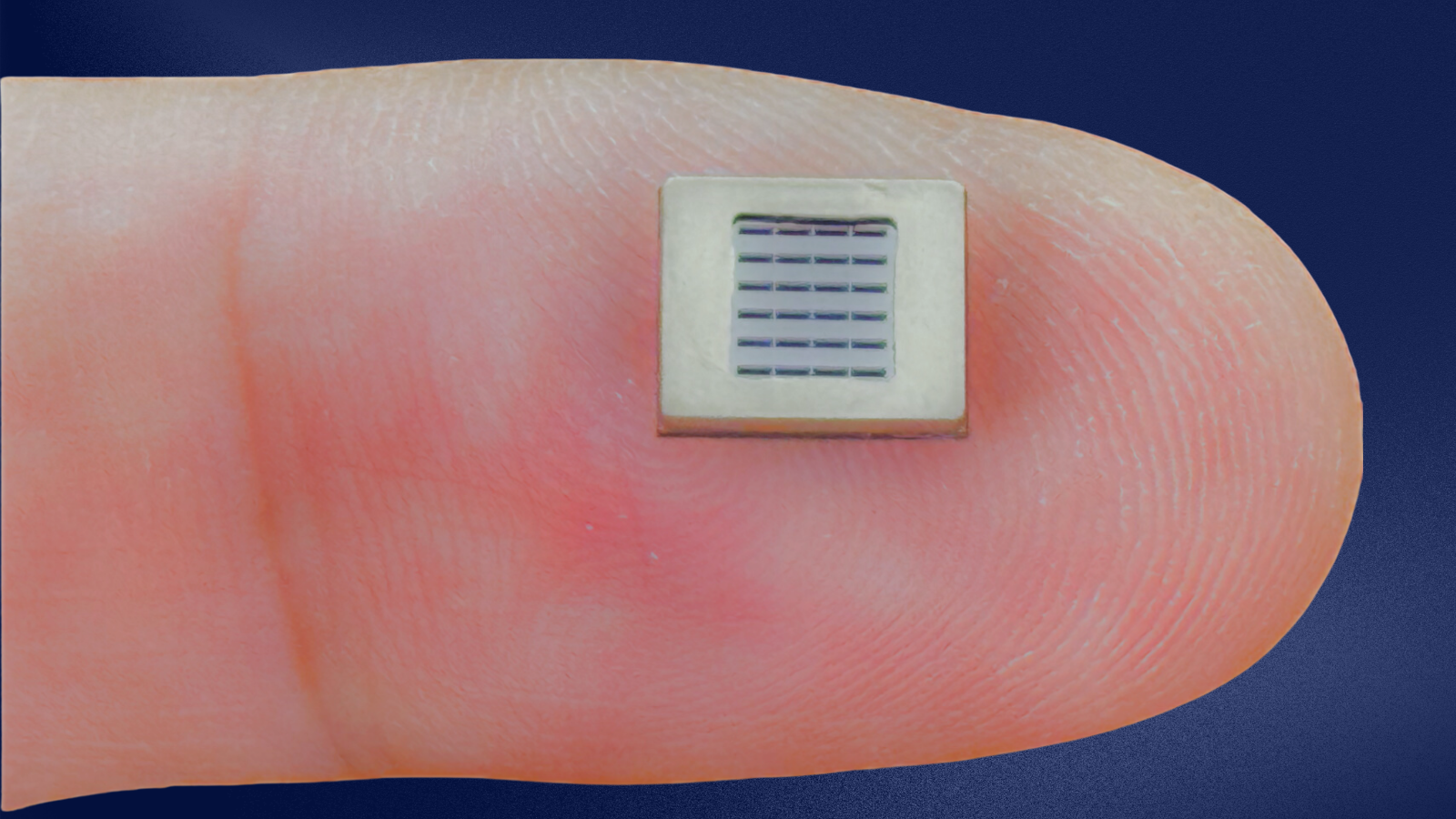Ultrasonic earbuds with 'advanced noise-cancellation' could launch as soon as 2025
Say goodbye to earbuds that break down and create fuzz. New ultrasonic audio chip could lead to digital headphones with better noise-cancelling and spatial audio.

Headphones may finally move past centuries' old technology thanks to a new type of micro-speaker that uses ultrasonic waves. The new audio chip could pave the way for noise-cancelling earbuds that can also recreate the illusion of sound coming from multiple directions.
The startup xMEMS first showcased its audio chip Cypress — which measures roughly 0.25 inch by 0.25 inch (6.3 by 6.5 millimeters) — at CES 2024 on Jan. 9. It will make its way into earbuds and headphones by the end of next year, company representatives told Live Science.
In conventional speakers, a metallic coil is wrapped around a magnet, and an electrical current passes through the coil. The electromagnetism generated by the passing current interacts with the magnetism of the permanent magnet, which pushes the coil back and forth like a piston. This coil is also attached to a speaker cone, or diaphragm, which pushes air to generate sound. The technology was first proposed in the 1800s, but it's still used in headphones today.
However, speakers designed this way are prone to damage, wear-and-tear and issues such as phase distortion — in which the shape of the sound waveform changes during the signal-conversion process, creating a lag and causing fuzz sounds.
The Cypress micro-speaker, on the other hand, is a silicon chip with two components: an application-specific integrated circuit (ASIC), which processes the electrical signals from a sound file; and an ultrasonic transducer. This latter component translates the signal into sound waves using the piezoelectric effect — in which a material changes volume (or moves) when a current is applied to it.

Related: These noise-canceling headphones can filter specific sounds on command, thanks to deep learning
The transducer is made of micro-electromechanical systems (MEMS) — microscopic machines that incorporate electronic and moving parts. They are widely used in consumer electronics such as buzzers and sound receivers.
Sign up for the Live Science daily newsletter now
Get the world’s most fascinating discoveries delivered straight to your inbox.
Like older technologies, the Cypress transducer moves air to generate sound waves. Unlike most MEMS, though, which are made up of piezoelectric crystals or ceramics, Cypress uses a new class of thin piezoelectric films made from lead zirconate titanate (PZT).
The PZT is incorporated as a layer in the semiconductor manufacturing process together with a silicon speaker diaphragm layer. When applied in this way, the films can produce high-resolution, high-quality sound, company representatives told Live Science.
The ASIC chip first receives and interprets the electrical signals and transmits them to the piezoMEMS transducer. The thin film vibrates at a high ultrasonic frequency, generating air pulses that map to the original audio signal. This generates air pressure inside the Cypress chip. Finally, demodulation piezoMEMS valves convert this acoustic energy into audio at frequencies we can hear.
Unlike conventional speakers, the speaker output shows near-zero phase shift, xMEMS representatives said in a statement, and is, therefore, more suited to features such as spatial audio, which simulates the experience of being surrounded by speakers in different locations.
The Cypress chips could also be used to create better noise-cancelling technology, which generates a tailored sound wave to cancel ambient noise. In theory, Cypress' faster mechanical response and near-zero phase coherence should enable higher-frequency noises to be canceled, which headphones today struggle to mask. This movement in the Cypress chip also generates far more energy and pressure at low frequencies — 40 times more than the company's previous non-ultrasonic micro-speaker chip — which equips it with anti-noise needed to cancel these sounds.
Following its demonstration at CES, xMEMS has begun shipping samples to a handful of its customers. The company plans to release a production-ready version of Cypress in June 2024. Mass production could begin by late 2024 or early 2025 — before earbuds fitted with the chip go on sale as soon as the end of next year.

Keumars is the technology editor at Live Science. He has written for a variety of publications including ITPro, The Week Digital, ComputerActive, The Independent, The Observer, Metro and TechRadar Pro. He has worked as a technology journalist for more than five years, having previously held the role of features editor with ITPro. He is an NCTJ-qualified journalist and has a degree in biomedical sciences from Queen Mary, University of London. He's also registered as a foundational chartered manager with the Chartered Management Institute (CMI), having qualified as a Level 3 Team leader with distinction in 2023.









